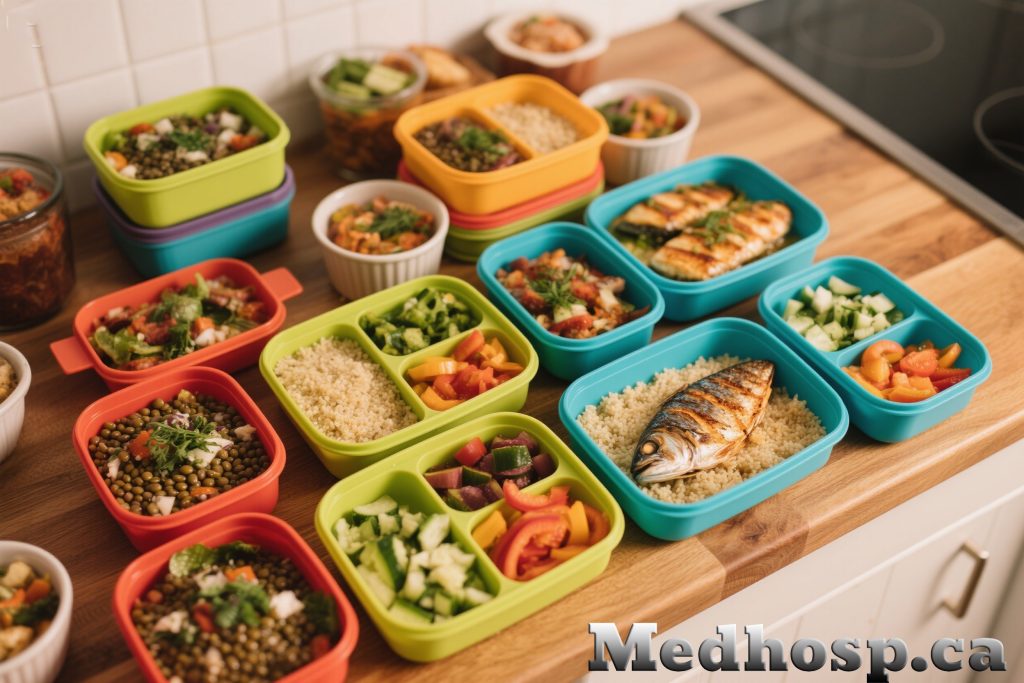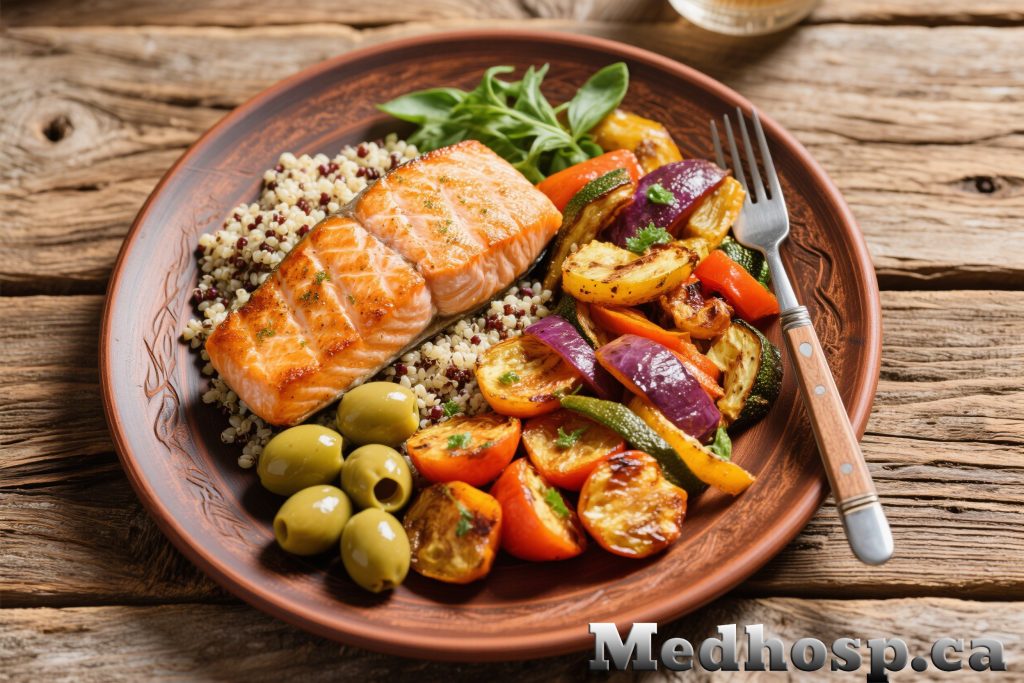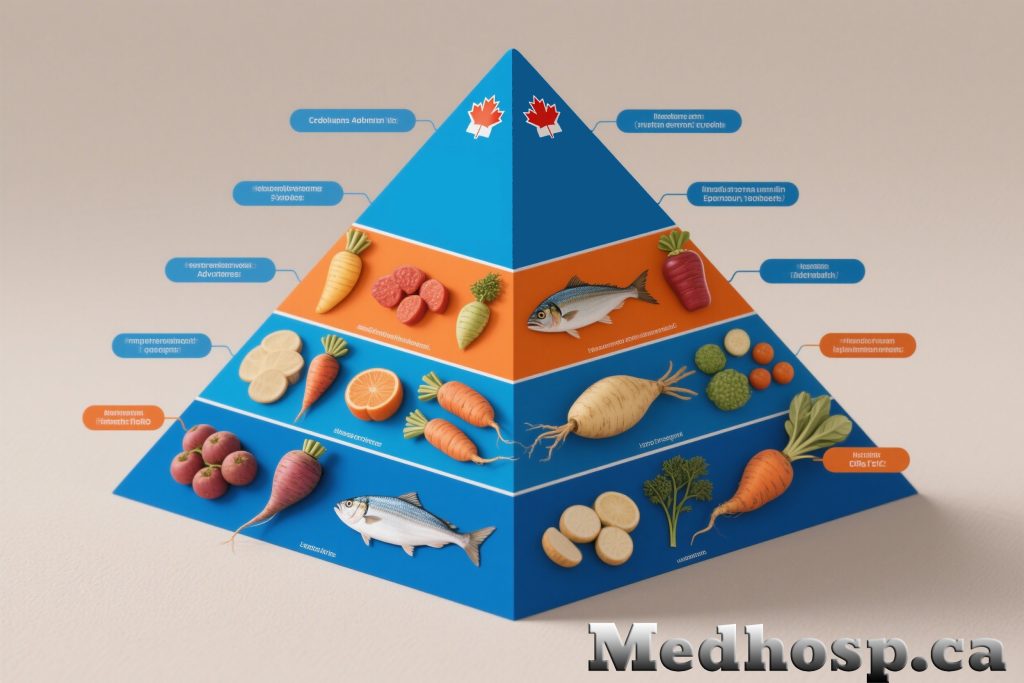
Wondering if the Mediterranean diet is right for you? Discover how Canadians are embracing this heart-healthy lifestyle and whether it fits your wellness goals in 2025.
Introduction
With growing awareness around heart health, longevity, and anti-inflammatory eating, the Mediterranean diet has become one of the most recommended dietary patterns in the world. But what does this diet mean for Canadians in 2025? Is it realistic, affordable, and effective for our unique lifestyle, climate, and food availability?
In this guide, we’ll explore the Mediterranean diet through a Canadian lens, breaking down its principles, benefits, challenges, and how to adapt it using local ingredients and habits.

What Is the Mediterranean Diet?
The Mediterranean diet is inspired by the traditional eating patterns of countries like Greece, Italy, and southern Spain. It emphasizes:
- Fruits and vegetables
- Whole grains
- Legumes and nuts
- Healthy fats (especially olive oil)
- Lean proteins, especially fish and poultry
- Moderate intake of dairy and wine
- Limited red meat and processed foods
More than just a meal plan, it’s a lifestyle rooted in community, slow eating, and natural foods.
Why the Mediterranean Diet Works
Backed by decades of scientific research, this diet is linked to a reduced risk of:
- Heart disease
- Type 2 diabetes
- Stroke
- Obesity
- Cognitive decline
Its secret? A balanced approach that avoids extremes. Instead of eliminating food groups, it focuses on nutrient-dense, minimally processed foods eaten in moderation.
Is the Mediterranean Diet Suitable for Canadians?
Yes — with a few smart adjustments. Canada’s climate, food supply, and cultural diversity require a flexible approach.
What Fits Well:
- Abundant local vegetables: Think spinach, kale, carrots, squash, and tomatoes.
- Canadian seafood: Swap Mediterranean anchovies and sardines for salmon, trout, or Arctic char.
- Whole grains: Canadian oats, barley, and rye are excellent options.
- Legumes: Lentils, chickpeas, and black beans are widely available and affordable.
What Needs Adapting:
- Fresh herbs and produce in winter months may be costly — frozen options are a great alternative.
- Olive oil can be pricey. Consider cold-pressed canola oil as a budget-friendly substitute rich in omega-3s.

Core Mediterranean Meals Made Canadian
Let’s explore how a typical Mediterranean meal might look when adapted for a Canadian kitchen.
Breakfast:
- Greek yogurt with frozen berries, flaxseed, and a drizzle of local honey
- Whole grain toast with avocado and a soft-boiled egg
Lunch:
- Lentil soup with kale and carrots
- Whole grain wrap with hummus, spinach, and roasted red pepper
Dinner:
- Baked trout with roasted sweet potatoes and steamed broccoli
- Brown rice bowl with grilled chicken, chickpeas, cucumbers, and tzatziki

Who Should Consider the Mediterranean Diet?
This diet is a great fit for:
- Adults over 40 managing cholesterol or blood pressure
- Busy professionals looking for simple, sustainable eating
- Seniors who want to reduce inflammation and maintain cognitive health
- Young families aiming to raise healthy kids on real food
And best of all — it doesn’t feel like a “diet.” There’s no calorie counting or strict rules. Just real food, eaten with intention.
Common Questions Canadians Ask
Is the Mediterranean Diet Expensive?
Not necessarily. Staples like beans, grains, and frozen vegetables are affordable. Shop seasonally, buy in bulk, and prioritize whole foods.
Do I Have to Eat Seafood?
Not every day. The diet recommends 2–3 servings of fish per week, but you can include eggs, legumes, and tofu as protein sources.
Do I Need to Drink Wine?
No! While red wine in moderation is part of the traditional Mediterranean pattern, it’s not required — and may not be suitable for everyone. Herbal teas or sparkling water are great alternatives.

Mediterranean Diet: Canadian Grocery List
Here’s a beginner-friendly shopping list tailored to Canadian pantries:
Proteins:
- Canned tuna or salmon
- Skinless chicken breast
- Lentils, chickpeas, and black beans
Grains:
- Brown rice
- Oats
- Barley
- Whole grain bread or pasta
Produce:
- Leafy greens (fresh or frozen)
- Carrots, onions, garlic
- Tomatoes (canned or fresh)
- Apples, pears, berries (frozen works too)
Healthy Fats:
- Olive oil or canola oil
- Walnuts, almonds
- Avocados
Flavor Boosters:
- Herbs and spices (oregano, basil, cumin)
- Lemon
- Vinegars (balsamic or apple cider)
Potential Drawbacks
While the Mediterranean diet is generally safe, some things to consider:
- It may be low in calcium if you skip dairy. Include leafy greens, almonds, and fortified plant milks.
- Portion control matters. Too much olive oil or nuts can stall weight loss.
- It’s not “low carb,” so it might not suit those on keto or strict diabetic diets.
Always consult with a dietitian or healthcare provider to personalize your approach.
Final Thoughts: Is It Right for You?
The Mediterranean diet offers an easy, delicious, and science-backed path to better health — and it’s absolutely adaptable for Canadian lifestyles. Whether you’re managing your weight, preventing disease, or simply looking to feel better, this way of eating is balanced, satisfying, and sustainable.
It’s not about perfection, but progress one delicious, olive-oil-drizzled bite at a time.
Bonus:
Easy Mediterranean Recipes for Canadians (with Videos)
Here’s a handy table of beginner-friendly Mediterranean meals using ingredients commonly found in Canada. Each recipe includes a description and a trusted YouTube video link to help you cook it at home.
| Meal Type | Recipe Name | Main Ingredients | Quick Description | YouTube Tutorial Link |
|---|---|---|---|---|
| Breakfast | Greek Yogurt Bowl | Greek yogurt, berries, flaxseed, honey | A high-protein, fiber-rich start to your day | Watch Recipe |
| Breakfast | Avocado Toast with Egg | Whole grain bread, avocado, egg | Simple, nutritious, and packed with healthy fats | Watch Recipe |
| Lunch | Mediterranean Lentil Soup | Lentils, carrots, kale, olive oil, garlic | A hearty, plant-based comfort soup | Watch Recipe |
| Lunch | Hummus Veggie Wrap | Hummus, whole grain wrap, bell peppers, cucumbers | Fresh and filling, great for on-the-go meals | Watch Recipe |
| Dinner | Baked Salmon with Quinoa | Salmon, lemon, quinoa, spinach | Omega-3-rich and easy to prepare | Watch Recipe |
| Dinner | Chicken Shawarma Bowl | Chicken breast, brown rice, chickpeas, herbs | A protein-packed one-bowl meal | Watch Recipe |
| Snack | Mediterranean Mezze Plate | Hummus, olives, pita, cherry tomatoes, cheese | A great snack or light meal with variety | Watch Recipe |
| Snack | Olive Tapenade | Black olives, garlic, lemon, olive oil | A flavorful dip or spread for crackers or bread | Watch Recipe |
Sources:
All videos link to popular and well-rated YouTube cooking channels like Tasty, Downshiftology, or Mediterranean Living.
Disclaimer
Some of this content may be generated using AI and reviewed for accuracy by our editorial team. Always consult a healthcare professional before making dietary changes.
I’m trying the Mediterranean diet myself. It’s helping me losing weight while keeping my muscles